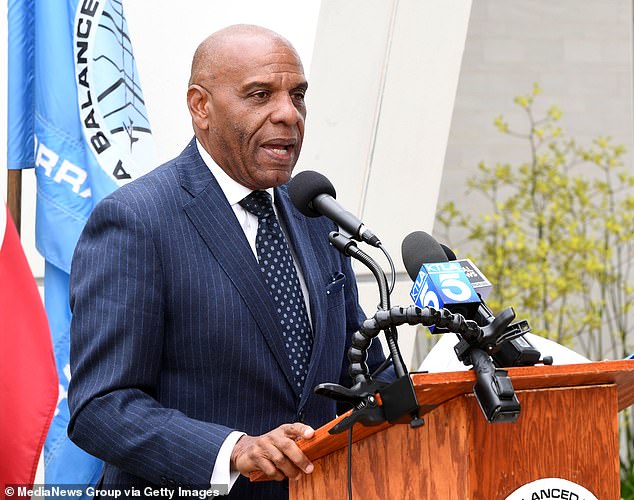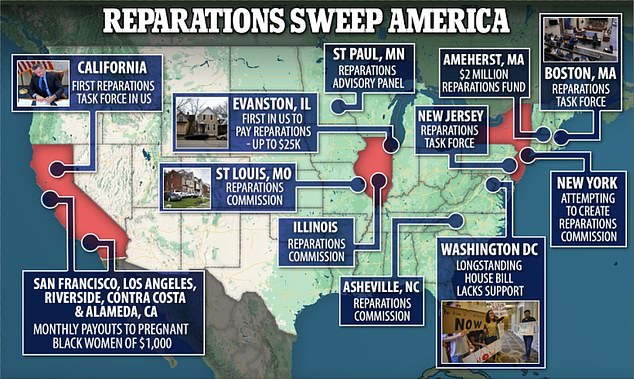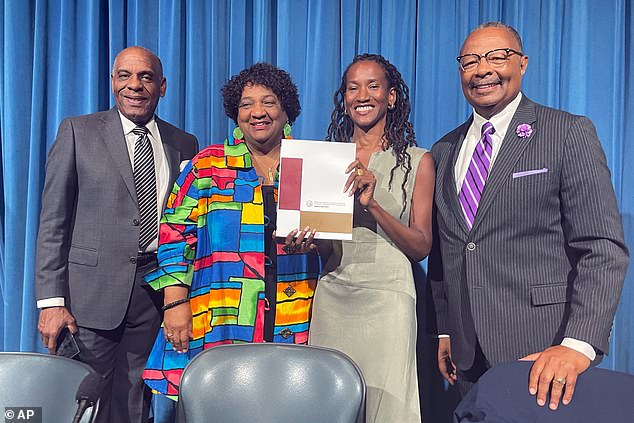California lawmakers have voted to officially apologize for the state’s role in slavery, but efforts to make cash reparations payouts have been shelved.
The California Assembly on Thursday backed a bill authored by Assemblyman Reggie Jones-Sawyer that accepts responsibility for ‘all of the harms and atrocities committed by the state.’
The Los Angeles Democrat received hugs and applause on the assembly floor after the bill was passed. It now moves on to the Senate.
‘Not only is the apology letter important … it’s whether or not we go ahead and fulfill the dream of what my ancestors wanted, which is to fully make us part of the American dream,’ Jones-Sawyer said.


Lawmakers also approved plans to help black families research their family lineage, recover land unjustly taken from them, and to create a state fund for reparations programs.
But landmark pieces of reparations legislation — bills to give property tax and cash payouts to the descendants of slaves — were shelved in a Senate fiscal process.
State Sen. Steven Bradford, the LA Democrat who authored the bills, said they were shelved largely because of the state’s roughly $45 billion budget deficit.
‘It’s a financial challenge this year,’ Bradford said, according to the LA Times.
‘But we always knew it wasn’t going to be a one and done. This is going to be a multiyear approach.’
The bills were culled in a process known as the ‘suspense file’, which is sometimes used to nix controversial legislation.
The California Legislative Black Caucus has pushed hard to turn reparations into reality, including through a first-in-the-nation task force that wrapped up last year.
But while voters and politicians have gotten behind plans to issue an official apology, which does not have a large price tag, cash payouts to the descendants of slaves have failed to gain traction.
A survey last year of 6,000 registered California voters found that only 23 percent supported cash reparations, while 59 percent were opposed.
Reparations campaigners have been divided on the best success strategy after years of deliberation as they aim to deliver tangible benefits to those descended from slaves.
The bill to issue a formal apology saw unanimous support from Democrats, but several Republicans abstained from voting on it.
Assembly Republican Leader James Gallagher did not vote.


He said slavery was a ‘terrible stain on our history’ but objected to other parts of the bill about the state denying rights to black residents and saying police shootings are ‘state-sanctioned violence.’
‘We have made tremendous progress toward a more equal society,’ Gallagher said.
California would join several states that have apologized for slavery and racist policies, including Delaware, Virginia, Maryland, North Carolina, and Alabama
Such cities as Boston and San Francisco have issued their own apologies.

The reparations movement gathered momentum across the US amid the race protests over the police killing of George Floyd in 2020, but progress has stalled more recently.
Campaigners say it’s time for America to repay its black residents for the injustices of the historic Transatlantic slave trade, Jim Crow segregation and inequalities that persist to this day.
The sums are eye-watering — black lawmakers in Washington seek at least $14 trillion for a federal scheme to ‘eliminate the racial wealth gap’ between black and white Americans.
Critics say payouts to selected black people will inevitably stoke divisions between winners and losers, and raise questions about why American Indians and others don’t get their own handouts.
California saw a lively debate about whether payouts should benefit black people, or only those who can show they are descendants of slaves.
Reparations are popular among the black people who stand to benefit from them, but unpopular among the whites, Asians, and others who would foot the tax bill without themselves benefiting.


